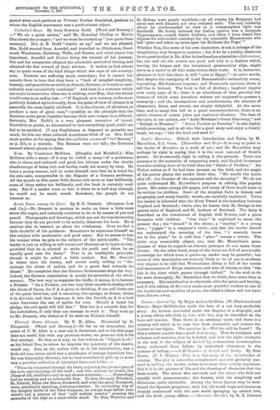Scott's Marmion. Edited, with Introduction and Notes, by M. Macmillan,
B.A. Oxon. (Macmillan and Co.)—It is easy to point to the faults of Marmion an a work of art ; and Mr. Macmillan may perhaps be right in saying that it is the most unequal of Scott's poems. He is assuredly right in calling it the greatest. There are passages in the narrative of surpassing merit, and English literature contains nothing finer of its kind than the " Battle of Flodden." Sir Walter writes as if he had been present on the field, and the magic of hie genius places the reader there also. "He smells the battle afar off ; the thunder of the captains and the shouting." We do not quite understand Mr. Macmillan's purpose in editing this popular poem. His notes occupy 130 pages, and many of them would seem to be written for children. Some of the simplest facts in history and geography, and many familia: words, are carefully explained. Twice the reader is informed that the River Tweed is the boundary between England and Scotland ; twice, also, he learns that St. George is the patron saint of England, and St. Andrew of Scotland. The daisy is described as the commonest of English wild flowers, and a great favourite with children. "Oar time" is explained to mean the present day ; the " strand " is the shore ; a " sapling " is a young tree ; "juggle" is a conjurer's trick; and, lest the reader should not understand the meaning of the line, " I scarcely know me in the glass," he is told that " glass " means a mirror. The critic may reasonably object, too, that Mr. Macmillan's para- phrases of what he regards as obscure passages do not make them clearer. On the other hand, many of the notes are full of serviceable knowledge for which even a grown-up reader may be grateful; but notes of this description are scarcely likely to be of use to students who require to be told that Westminster Abbey is fall of the tombs and monuments of Kings, statesmen, and men of letters, or that "the Isis is the river which passes through Oxford." In the wish to do his work thoroughly, Mr. Macmillan has, we think, done more than is necessary. His introduction is admirable alike for point and brevity, and if this edition of Marmion sends more youthful readers to one of the healthiest and manliest of pouts, the editor's labour will not have been thrown away.


















































 Previous page
Previous page